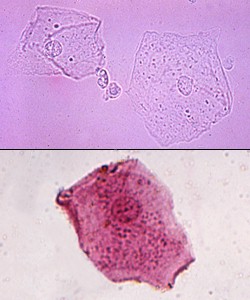Squamous epithelial cells are the largest cells which can be present in normal urine samples.
 They are thin, flat cells, usually with an angular or irregular outline and a small round
nucleus. They may be present as single cells or in variably-sized clusters. Those shown in
the upper panel are unstained; that in the lower panel was prepared using Sedi-Stain.
They are thin, flat cells, usually with an angular or irregular outline and a small round
nucleus. They may be present as single cells or in variably-sized clusters. Those shown in
the upper panel are unstained; that in the lower panel was prepared using Sedi-Stain.
Squamous cells are common in low numbers in voided specimens and generally represent contamination from the genital tract. Their main significance is as an indicator of such contamination. Many dogs with squamous metaplasia of the prostate, due either to exogenous estrogen or Sertoli cell tumor, have extremely large numbers of squamous cells in urine. |
Last Updated: January 16, 1996